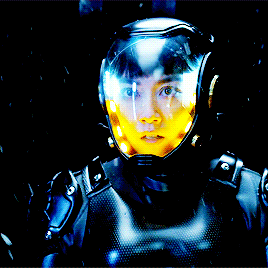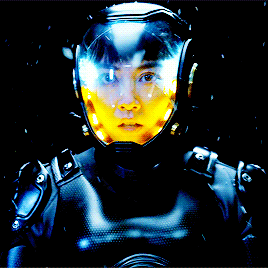Let me climb to the highest rooftop in the country and shout the following mantra to the stars: I love Mako Mori!
Maybe it’s a personal thing. I’ve always liked unassuming girls who kick ass (re: Buffy the Vampire Slayer, Jessica Jones) or maybe it’s because Pacific Rim is one of the only big action films in recent memory where women aren’t used to sex-up the story or sit around passively like dismantled doll parts.
Why do I love Mako Mori? For starters, she’s an Asian woman in a western film who isn’t fetishized. She isn’t presented as a porcelain ballerina or delicate flower, and she doesn’t act like a bubbly anime girl. Popular culture is saturated with two Asian stereotypes: the ditzy, pixie-like girl and the warrior woman trained in martial arts. What doesn’t help this limited spectrum are the dreamy girls with circle lenses and luminous skin flooding social media or the drooling dudes who describe young Asian women as goddesses.
Thanks to Guillermo del Toro, Mako is none of these things. She’s a flesh-and-blood woman with layers to her personality and a drive that catapults her above the role of girlfriend or a mere support structure for the male protagonists.
For the female lead in a summer blockbuster, casting Rinko Kikuchi wasn’t an obvious choice. This is a non-American, non-white actress best known for indie films and her Oscar-nominated role as a deaf, touch-starved teenager in Babel. Kikuchi loses the unhinged presence of that part but none of its melancholy. When we first meet Mako, she appears cool and collected, a tightly coiled enigma, but in segments she reveals a bruised, grief-stricken core.
In other words, Mako has too many emotions, and too much baggage, rippling beneath the surface to waste time casting sultry looks at Charlie Hunnam.
And, okay, cliché alert, Mako is set up as a potential love interest for brooding golden boy Raleigh, but that doesn’t take up the main focus of the story. Outside of their heated sparring sessions, Mako and Raleigh’s chemistry is sweet, almost gentle. They bubble together like best friends and the crux of their relationship hinges on their compatible mindset rather than what happens when they fall into bed together. Instead of the famed end of film kiss we’ve all come to expect, Raleigh and Mako touch foreheads, a sign of shared intellect and intimacy that surpasses any fleeting gratification of lust.


Omit her relationship with Raleigh, and Mako still has a presence. Sure, her character arc has been used before, driven by vengeance and a desire to save the world, but she’s still the most interesting character in del Toro’s oddball ensemble. Sometimes, in their quest to create the ultimate “strong woman”, filmmakers go too far and instead make ones who resemble automatons. Mako isn’t so predictable. She’s strong, yes, but also vulnerable, not afraid to let herself cry or dwell in the past. At the same time, she’s pragmatic. She loves her surrogate father, Stacker Pentecost, but there are no syrupy declarations, and she fights alongside men without expecting them to protect her.
And not once does Mako stumble into the pitfalls of damsel. Apart from a flashback scene where she’s rescued as a child, she helps in the fight against the kaiju just as much as Raleigh. Reversing the age-old stereotype, she becomes the one who rescues him, giving him new purpose after years of drifting and allowing him to forge a meaningful relationship after the death of his brother. She also kicks some gnarly kaiju butt, revelling in the fight just as much as her comrades and refusing to give up even when Raleigh does.
Unfortunately, Pacific Rim isn’t perfect. Mako is the only main female character, and her pivotal relationships are with men who are essentially cast in the roles of father and boyfriend. But I love Mako because she doesn’t exist for these men. Not once does she allow her existence to be defined by them or be crippled by her feelings for them. Even if these characters were removed from the storyline, her agency would still be intact. She would still find a way to fight for what she believes in and to pick herself up when she falls.
In a way, it’s a shame Mako never has the opportunity to strike out on her own because her story is arguably more interesting than Raleigh’s: the little girl orphaned by the kaiju who grows up to be one of its greatest nemeses.
Issues with plot aside, I wish there were more women like Mako in mainstream cinema. She’s a character that doesn’t have to be the sassy wise-ass, flirtatious kitten or frigid bitch; roles so many women are forced into. She becomes the heart of the film, and she carries it with grace, inner confidence and a fire that cannot be quelled, no matter how many loved ones die or how many men tell her she’ll never be enough. This is the type of character women need.
- The Super Girl Dossier is a monthly feature celebrating amazing women in film, television, music and art
